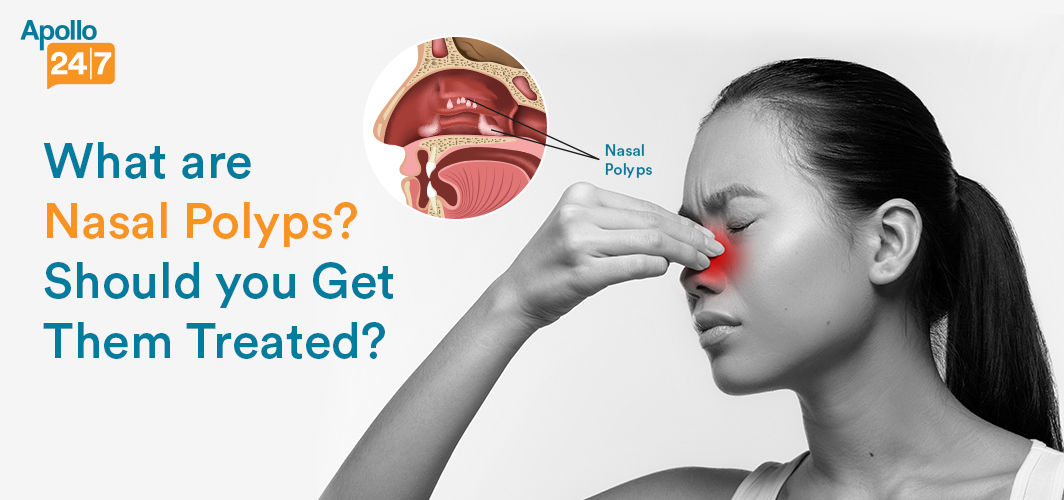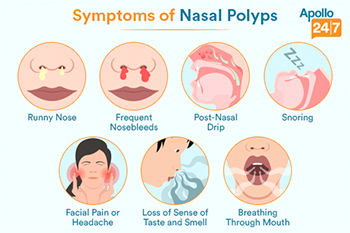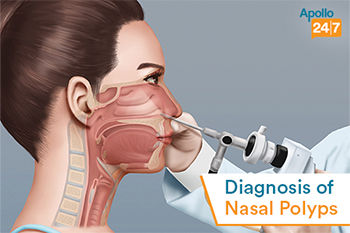General Health
What are Nasal Polyps? Should you Get Them Treated?
4 min read
By Apollo 24|7, Published on - 13 July 2022, Updated on - 20 January 2023
Share this article
0
2 likes

Nasal polyps are non-cancerous (benign) growths within the lining of the sinuses and nasal passages. They are soft, painless, and are often caused by chronic inflammation that occurs due to recurring allergies, infections, drug sensitivity, or certain immune disorders.
While not all nasal polyps will cause symptoms, the larger ones should get treated as they become irritated and can lead to breathing problems, chronic infections, a loss of taste or smell, blocked nose, nose bleeds, and snoring too!
What causes nasal polyps?
It is still unclear, researchers are still studying the reasons behind the formation of nasal polyps. However, underlying inflammation of the nasal tissues plays some sort of role. It has been observed that nasal polyps are more common in people with these health conditions.
- Asthma
- Aspirin sensitivity
- Chronic sinus infections
- Cystic fibrosis
- Hay fever (allergic rhinitis)
Certain genes may also help lead to the development of nasal polyps. This is especially true of genes that play a role in the immune system and inflammatory responses. You may be more likely to have nasal polyps if other members of your family have had them.
What are the symptoms that you might have nasal polyps?
While you may not have symptoms at first, as your nasal polyps grow, you may experience:

- Nasal congestion & drainage (stuffy or runny nose)
- Nosebleeds
- Snoring
- Headaches
- Pain or pressure in the sinus cavities or along the top of your face, forehead, or pain in the upper teeth
- Loss of taste or smell
- The need to constantly clear your throat (postnasal drip)
- Frequent/increased asthma attacks
- Frequent allergies
- Trouble sleeping
How are nasal polyps diagnosed?
If you suspect that you have nasal polyps, please reach out to an ENT doctors and book a consultation. Do not try to prick or tease the nasal passage yourself.
The doctor will take a detailed medical history and ask you about past infections or current allergies that you have. Additionally, the doctor will outline common nasal polyp symptoms, ask if you have experienced any of them, and will take a look inside your nose with a nasal endoscope.

A nasal endoscopy or CT scan or MRI will help in getting a better picture of the inside of your sinus cavities and nasal passages to determine the extent of your nasal polyps. Also, to diagnose other medical conditions that are leading to nasal discomfort.
How are the nasal polyps treated?
Treatment will depend on your symptoms, age, and general health. It will also depend on how severe the condition is and the size of the polyps.
Usually, treatment will aim to reduce inflammation, as well as the size of your polyps. An ENT might often start treatment with steroid medications breathed in (inhaled) through the nose. These medicines can decrease the inflammation at the root of the problem. However, people who do not respond to this might need steroid medicines taken by mouth. Other treatments for nasal polyps include:
- Medicines to help decrease inflammation
- Antibiotics to help reduce polyp size
- Daily rinsing of the sinuses with a saltwater solution
- Antihistamines, to reduce allergic reactions
- Allergen immunotherapy and removal of allergens
- Aspirin desensitization therapy (only if the person is not allergic to aspirin)
- Medications are given as a shot (injection) every other week
Takeaway
Nasal polyps are common and can happen at any age. One would need an ENT’s help to treat them, especially the ones which are causing symptoms. To be noted, you may still have symptoms despite trying therapies. If that is the case, then only surgery may help. Surgery does often get rid of most symptoms but will help in the removal of polyps. However, the polyps may develop back within a few months to a few years. Still, it is important to address the underlying cause of your nasal polyps to help prevent constant nasal discomfort.
Need Expert Advice? Consult With an Expert ENT Specialist
- Authored by Dr. Tulika Roy
General Health
Leave Comment
Recommended for you

General Health
20 Things You Must Have In Your First-Aid Kit
Every house should have a first aid kit to handle emergencies. From antiseptic lotion to bandages, cotton rolls and disposable gloves, here are 20 items that you should have in your first aid kit.

General Health
Precautions And Home Management Tips To Treat Conjunctivitis
Combat Conjunctivitis at Home with Expert Precautions & Tips for Effective Management. Safely treat and ease symptoms of Conjunctivitis with these tips.

General Health
Albumin Test: A Protein Test To Check Your Liver & Kidney Health
An albumin test measures protein levels in your blood and helps assess liver and kidney function. Learn when it's recommended and what your results may indicate.
Subscribe
Sign up for our free Health Library Daily Newsletter
Get doctor-approved health tips, news, and more.
Visual Stories

The Best Exercises for Controlling Blood Sugar Levels
Tap to continue exploring
Recommended for you

General Health
20 Things You Must Have In Your First-Aid Kit
Every house should have a first aid kit to handle emergencies. From antiseptic lotion to bandages, cotton rolls and disposable gloves, here are 20 items that you should have in your first aid kit.

General Health
Precautions And Home Management Tips To Treat Conjunctivitis
Combat Conjunctivitis at Home with Expert Precautions & Tips for Effective Management. Safely treat and ease symptoms of Conjunctivitis with these tips.

General Health
Albumin Test: A Protein Test To Check Your Liver & Kidney Health
An albumin test measures protein levels in your blood and helps assess liver and kidney function. Learn when it's recommended and what your results may indicate.